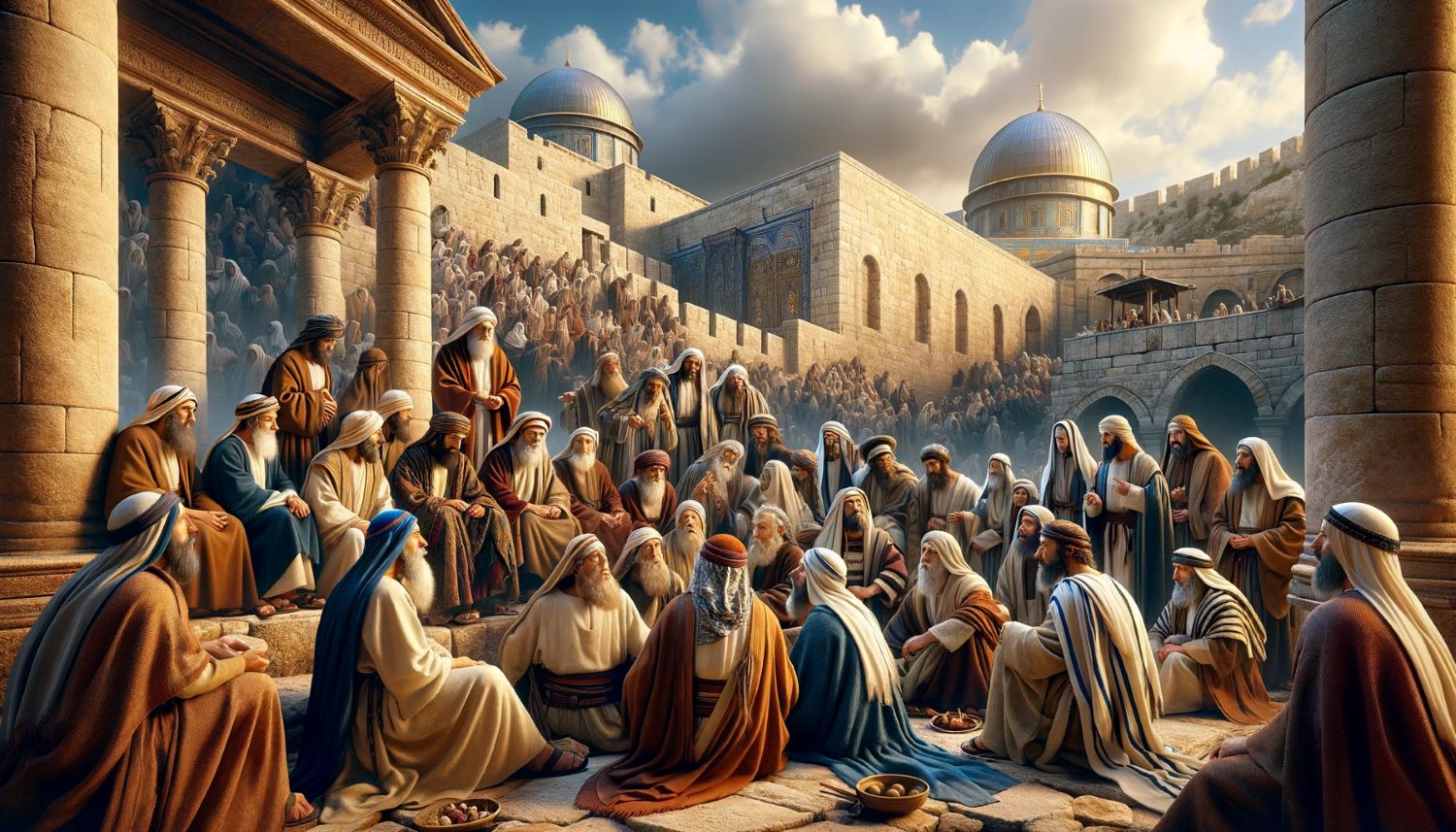Home>Bible Facts>About How Many Years Of Church History Does The Acts Of The Apostles Cover?


Bible Facts
About How Many Years Of Church History Does The Acts Of The Apostles Cover?
Published: February 22, 2024
Peter Smith, Editorial Director at Christian.net, combines deep insights into faith, politics, and culture to lead content creation that resonates widely. Awarded for his contributions to religious discourse, he previously headed a major organization for religious communicators, enhancing dialogue on faith's societal impacts.
Discover fascinating Bible facts about the Acts of the Apostles and learn how many years of church history it covers. Explore the historical significance of this pivotal book.
(Many of the links in this article redirect to a specific reviewed product. Your purchase of these products through affiliate links helps to generate commission for Christian.net, at no extra cost. Learn more)
Table of Contents
Introduction
The Acts of the Apostles, often referred to simply as Acts, is a crucial book in the New Testament of the Bible. It serves as a historical record of the early Christian church and provides valuable insights into the growth and development of Christianity in its formative years. Authored by the apostle Luke, who also wrote the Gospel of Luke, Acts offers a seamless continuation of the narrative from the life and teachings of Jesus Christ to the establishment and expansion of the early Christian church.
Acts is a captivating account that chronicles the actions and teachings of the apostles, particularly Peter and Paul, following the ascension of Jesus. It provides a compelling portrayal of the spread of Christianity from Jerusalem to Rome, highlighting the challenges, triumphs, and pivotal moments that shaped the trajectory of the faith. As such, Acts serves as a bridge between the Gospels and the epistles, offering a comprehensive depiction of the early Christian movement and its impact on the world.
This book is not merely a historical record; it also serves as a source of inspiration and guidance for believers. Through the accounts of miraculous events, bold preaching, and unwavering faith displayed by the early Christians, Acts conveys timeless lessons and principles that continue to resonate with contemporary audiences. It showcases the transformative power of the Holy Spirit, the unwavering commitment of the apostles to proclaim the gospel, and the enduring faith of the early believers in the face of persecution and opposition.
Acts of the Apostles is a testament to the enduring legacy of the early church and the profound impact of the gospel message. Its narrative serves as a compelling reminder of the faithfulness of God and the transformative power of the gospel, inspiring believers to emulate the dedication and zeal of the early apostles in spreading the message of salvation to the ends of the earth.
In the subsequent sections, we will delve deeper into the timeline, key events, and significant figures portrayed in the Acts of the Apostles, shedding light on the pivotal role this book plays in shaping the course of church history.
Overview of the Acts of the Apostles
The Acts of the Apostles, commonly known as Acts, is the fifth book of the New Testament and serves as a continuation of the Gospel of Luke. Authored by the physician and historian Luke, Acts provides a comprehensive account of the early Christian church's growth and expansion following the ascension of Jesus Christ. The narrative begins with the ascension of Jesus and the subsequent outpouring of the Holy Spirit on the Day of Pentecost, marking the birth of the Christian church.
Acts offers a vivid portrayal of the apostles' ministry, particularly focusing on the pivotal roles of Peter and Paul in advancing the gospel message. The book chronicles the spread of Christianity from Jerusalem to Rome, highlighting the missionary journeys, preaching, and miraculous events that contributed to the rapid expansion of the faith. Through compelling narratives and detailed accounts, Acts captures the challenges, triumphs, and transformative impact of the early Christian movement.
One of the central themes of Acts is the unstoppable advancement of the gospel message despite opposition and persecution. The book showcases the unwavering commitment of the apostles to proclaim the message of salvation, often in the face of adversity. Acts also emphasizes the pivotal role of the Holy Spirit in empowering and guiding the early church, leading to the establishment of Christian communities and the conversion of individuals from diverse backgrounds.
Moreover, Acts provides valuable insights into the early church's organizational structure, communal life, and the resolution of internal conflicts. It portrays the communal sharing of resources among believers, the appointment of deacons to oversee practical matters, and the council of Jerusalem, which addressed significant theological and cultural issues within the burgeoning Christian community.
The Acts of the Apostles is not merely a historical record but also a testament to the transformative power of faith and the enduring impact of the gospel. It serves as a source of inspiration for believers, highlighting the courage, resilience, and unwavering dedication of the early Christians in spreading the message of salvation. Acts continues to be a timeless narrative that resonates with readers, offering profound insights into the foundational years of the Christian church and the enduring legacy of the apostolic ministry.
In summary, Acts stands as a pivotal book that bridges the gap between the life and teachings of Jesus Christ and the establishment of the early Christian church. Its narrative richness, historical significance, and enduring relevance make it an indispensable part of the New Testament, offering invaluable lessons and inspiration for believers across generations.
Timeline of Church History Covered in the Acts of the Apostles
The Acts of the Apostles provides a compelling timeline of significant events that shaped the early history of the Christian church. The narrative unfolds with the ascension of Jesus Christ, marking the transition from His earthly ministry to the emergence of the apostolic era. The Day of Pentecost, as depicted in Acts 2, serves as a pivotal moment when the Holy Spirit descended upon the apostles, empowering them to proclaim the gospel with boldness and clarity.
The early chapters of Acts focus on the ministry of Peter, one of the prominent apostles, and the rapid growth of the church in Jerusalem. The miraculous healing of a lame beggar at the Beautiful Gate of the temple, coupled with Peter's powerful sermons, leads to the conversion of thousands, signifying the exponential expansion of the Christian community.
The persecution of early believers, notably the martyrdom of Stephen, triggers the dispersion of Christians from Jerusalem to various regions, laying the foundation for the spread of the gospel beyond the confines of Judea. Acts 8 portrays the evangelistic endeavors of Philip, who proclaims the gospel in Samaria and baptizes the Ethiopian eunuch, exemplifying the inclusive nature of the Christian message.
The conversion of Saul of Tarsus, a zealous persecutor of Christians, on the road to Damascus marks a transformative turning point in the narrative. Renamed Paul, he emerges as a central figure in the spread of Christianity to the Gentiles, embarking on missionary journeys that traverse Asia Minor, Greece, and eventually Rome.
The Council of Jerusalem, as documented in Acts 15, addresses the inclusion of Gentile believers in the Christian community, emphasizing the universal scope of the gospel message and the reconciliation of diverse cultural and religious backgrounds within the early church.
The latter chapters of Acts chronicle Paul's imprisonment, his journey to Rome, and his unwavering commitment to proclaim the gospel despite adversities. The book concludes with Paul's ministry in Rome, symbolizing the global reach of the Christian faith and the fulfillment of Jesus' commission to take the gospel to the ends of the earth.
The timeline depicted in the Acts of the Apostles encapsulates the foundational years of the Christian church, portraying the dynamic interplay of divine intervention, human agency, and the transformative power of the gospel. It serves as a testament to the enduring impact of the early apostolic ministry and the indelible imprint of the Christian message on the course of history.
Key Events and Figures in the Acts of the Apostles
The Acts of the Apostles presents a rich tapestry of key events and influential figures that significantly shaped the early history of the Christian church. These pivotal moments and individuals played a transformative role in the spread of the gospel and the establishment of Christian communities across diverse regions. The narrative unfolds with compelling accounts of miraculous interventions, bold proclamation of the gospel, and the unwavering commitment of prominent figures such as Peter and Paul.
Pentecost and the Outpouring of the Holy Spirit
The Day of Pentecost, as depicted in Acts 2, stands as a foundational event that marked the outpouring of the Holy Spirit upon the apostles. This extraordinary manifestation empowered the disciples to speak in diverse languages, enabling them to effectively communicate the message of salvation to a multinational audience gathered in Jerusalem. The dramatic events of Pentecost served as a catalyst for the rapid expansion of the Christian community, as thousands responded to Peter's powerful proclamation of the gospel and embraced the message of Christ.
Read more: Where In Acts Does It Talk About Baptism
The Conversion of Saul of Tarsus
The conversion of Saul, a zealous persecutor of Christians, on the road to Damascus represents a profound turning point in the narrative of Acts. This transformative encounter led to Saul's conversion to Christianity and his subsequent emergence as the apostle Paul, a central figure in the early church. Paul's dramatic transformation from a persecutor to a passionate advocate for the gospel exemplifies the redemptive power of Christ and underscores the inclusive nature of God's grace, extending even to those considered adversaries of the faith.
Missionary Journeys of Paul
The Acts of the Apostles meticulously documents the missionary endeavors of the apostle Paul, who embarked on several transformative journeys to proclaim the gospel to diverse regions. Paul's missionary zeal and unwavering commitment to spreading the message of Christ led to the establishment of numerous Christian communities and the conversion of individuals from varied cultural and religious backgrounds. His tireless efforts in regions such as Asia Minor, Greece, and eventually Rome exemplify the global reach of the Christian faith and the enduring impact of his apostolic ministry.
Council of Jerusalem
The Council of Jerusalem, as depicted in Acts 15, represents a significant milestone in the early history of the Christian church. This pivotal gathering addressed crucial theological and cultural issues, particularly the inclusion of Gentile believers in the Christian community. The council's decision to embrace Gentile converts without imposing burdensome requirements underscored the universal scope of the gospel message and the reconciling power of Christ, transcending cultural barriers and fostering unity within the burgeoning Christian movement.
Imprisonment and Ministry of Paul
The latter chapters of Acts portray Paul's imprisonment and his unwavering commitment to proclaim the gospel despite adversities. His resilience in the face of persecution and his steadfast dedication to sharing the message of Christ serve as a testament to the enduring impact of his ministry. The narrative culminates with Paul's ministry in Rome, symbolizing the global reach of the Christian faith and the fulfillment of Jesus' commission to take the gospel to the ends of the earth.
The Acts of the Apostles vividly portrays these key events and figures, offering profound insights into the transformative power of the gospel and the enduring legacy of the early Christian movement. Through compelling narratives and detailed accounts, Acts continues to inspire and resonate with readers, highlighting the courage, resilience, and unwavering dedication of the early Christians in spreading the message of salvation.
Read more: How Many Times Is Baptism Mentioned In Acts
Significance of the Acts of the Apostles in Church History
The Acts of the Apostles holds profound significance in the annals of church history, serving as a foundational narrative that delineates the formative years of the Christian movement and its enduring impact on the course of history. This pivotal book not only provides a historical record of the early Christian church but also offers timeless insights and inspiration for believers across generations.
Acts serves as a bridge between the life and teachings of Jesus Christ, as depicted in the Gospels, and the establishment and expansion of the early Christian church. It offers a seamless continuation of the narrative from the ascension of Jesus, the outpouring of the Holy Spirit, and the apostolic ministry, providing a comprehensive portrayal of the transformative impact of the gospel message. The book chronicles the unwavering commitment of the apostles to proclaim the message of salvation, often in the face of persecution and opposition, exemplifying the courage and resilience of the early Christians.
Moreover, Acts captures the universal scope of the gospel message, emphasizing its inclusive nature and the reconciliation of diverse cultural and religious backgrounds within the burgeoning Christian community. The narrative of Acts transcends geographical boundaries, portraying the spread of Christianity from Jerusalem to Rome and beyond, signifying the global reach of the Christian faith. This global perspective underscores the enduring legacy of the apostolic ministry and the indelible imprint of the Christian message on the course of history.
The Acts of the Apostles also provides valuable insights into the early church's organizational structure, communal life, and the resolution of internal conflicts. It portrays the communal sharing of resources among believers, the appointment of deacons to oversee practical matters, and the council of Jerusalem, which addressed significant theological and cultural issues within the burgeoning Christian community. These insights offer a blueprint for communal living, unity, and the resolution of conflicts within the body of believers, serving as a timeless guide for the church across diverse contexts.
Furthermore, Acts stands as a testament to the transformative power of faith and the enduring impact of the gospel. Its narrative richness, historical significance, and enduring relevance make it an indispensable part of the New Testament, offering invaluable lessons and inspiration for believers across generations. The Acts of the Apostles continues to resonate with readers, inspiring them to emulate the dedication and zeal of the early apostles in spreading the message of salvation to the ends of the earth.
In summary, the Acts of the Apostles occupies a central position in church history, encapsulating the foundational years of the Christian church and the enduring legacy of the apostolic ministry. Its significance extends beyond historical documentation, encompassing timeless lessons, inspiration, and guidance for believers, thereby cementing its enduring relevance in the annals of Christian faith and practice.













